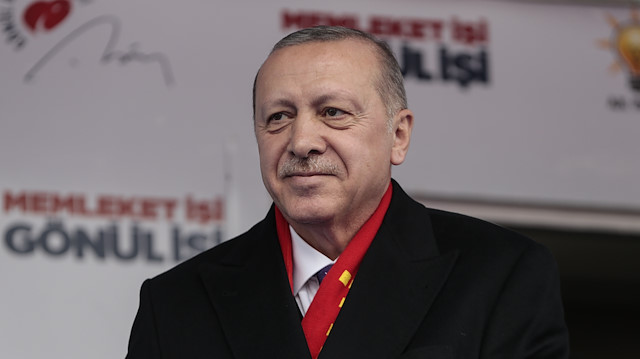
Turkish president's comments come amid US suggestions that Ankara should reconsider buying Russia’s missile defense system
Turkey’s president said Wednesday that Ankara has finalized an agreement on purchasing Russia’s S-400 missile defense system.
"We concluded the S-400 issue, signed a deal with the Russians, and will start co-production,” said Recep Tayyip Erdogan, speaking in a televised interview.
"Later, we may work with S-500s," the next generation system, Erdoğan said.
U.S. officials have suggested that Turkey should buy U.S. Patriot missiles rather than the Russian system, arguing the S-400 is incompatible with NATO systems. But Turkish officials have said that Turkey will not go back on its agreement with Russia, even if it were to also buy Patriots.
Erdoğan said Turkey had dealt heavy blows to the terrorist PKK at home and abroad as never seen before.
"Their strength both in the mountains and cities has been weakened a lot," he said.
He said Turkey would continue its counter-terror operations until the last terror threat against the country is eliminated.
"There has been a tremendous increase in the number of terrorists who surrendered. Participation in the PKK is at its lowest level," Erdoğan said, vowing to conduct new operations to destroy the roots of terrorism.
He went on to say that Turkey would destroy such roots regardless of their origin country.
"We will destroy them in Syria if they are coming from Syria, or in Iraq if they are coming from Iraq.
"Just like we eliminated the terror corridor in Syria, we will strike again if there are new developments there," Erdoğan said.
Recalling U.S. discourse on "not targeting Kurds", Erdoğan stressed that he warned U.S. President Donald Trump about using the wrong "expressions".
"I told [Trump] that as long as you use these expressions, you will make mistakes. Our struggle is against this [PKK] terror group, not against our Kurdish brothers. There might be Kurds, French, German, British people among this terror group," he said, noting that foreign Daesh terrorists were "from all around the world".
Erdoğan said Turkey would target "anyone who targets our soldiers, regardless of their nationality".
Turning to Syria, he said more than 310,000 Syrians had returned to their homes in Jarablus, Azaz, Afrin and Al-Bab.
"There is peace, freedom and democracy in those areas under Turkey's control."
He said "despite disputes sometimes", Turkey and Russia were maintaining their cooperation against terrorism in Syria's cities of Idlib and Afrin.
On the safe zone in Syria, Erdoğan recalled that he had first proposed establishing a safe zone to former U.S. President Barrack Obama.
Erdoğan said the safe zone must be controlled by Turkey and no other country would be allowed to share control.
"Because an attack from there [Syria] is possible at any moment.
"Let me tell you what they [the U.S.] will do; they will give control of this area to the YPG and PYD. It is not possible for Turkey to accept this."
Hailing Trump's "firm stance" on Syria’s safe zone, Erdogan said the U.S. "deep state" might be blocking the process.
"However, the U.S. must put an end to its ties with the PYD/YPG terror group."
In December, Trump announced plans to withdraw all 2,000 American troops from the war-torn country, saying the U.S.-led coalition had succeeded in militarily defeating Daesh.
Last month, however, the Trump administration backtracked, saying some 200-400 troops would remain in Syria as part of a peacekeeping effort.
U.S. military personnel have since said that a couple hundred troops will remain in the region, with forces staying in northeast Syria to create a "safe zone" as well as forces being stationed at the al-Tanf garrison in southern Syria.
Last week, while speaking to U.S. troops at Elmendorf Air Force Base in Alaska, Trump said that 100 percent of Daesh territory had been taken over.
Erdoğan warned the U.S. about the weapons they had given to terrorists in Syria and said the U.S. statement that they had the serial numbers of these weapons was not a solution.
He stressed that Turkey faced the same problem in Iraq and the weapons had been left to the PKK terror group.
"If the U.S. is to take weapons out of Syria, they can, as they are their own property. However, if they won't, give them to Turkey. If it is needed, we can sit at the negotiating table and buy them. They must not give these weapons to the terrorists," he said, referring to the YPG/PKK.


